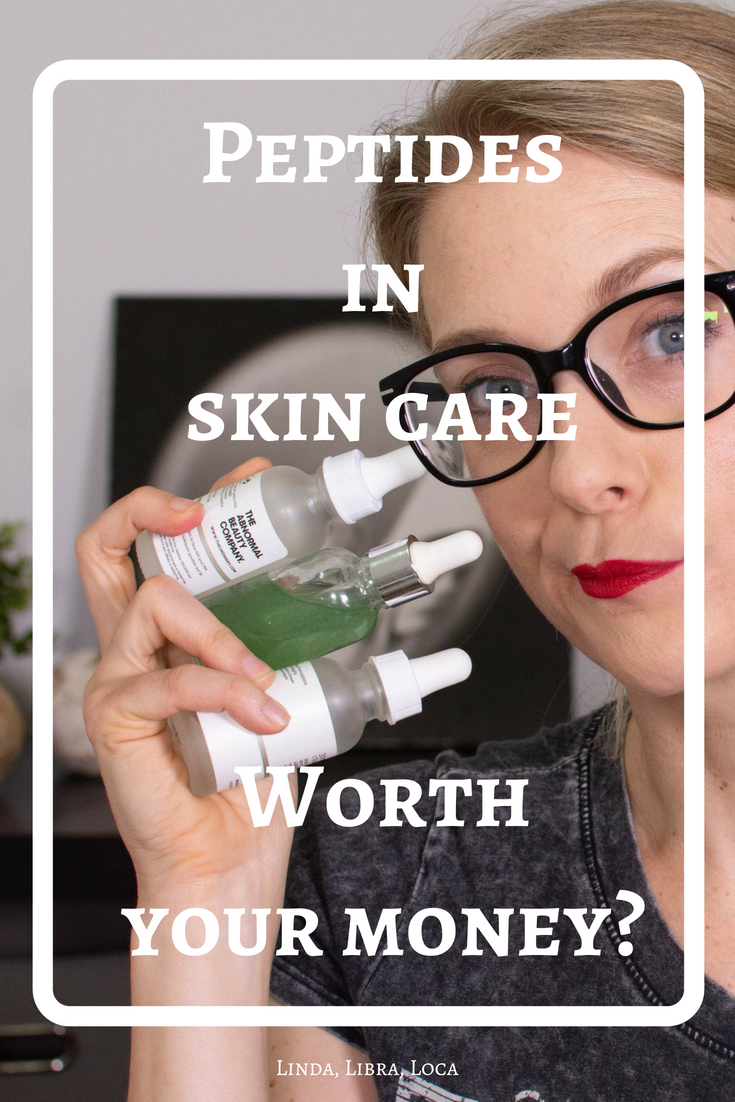“And it contains peptides!” – “Aaaahhh… What?”
Have you ever felt that way when someone tried to sell you a skincare product? I know I have. Peptides have been around for a few years, they are the “thing to have” in your routine, yet there is a lot of insecurity about what they actually do.

Or if they even do anything.
And that is okay, because the jury is still out on that. And the fact that there are over 100 peptides doing different things doesn´t really help either.
So I put on my glasses and filmed a video for you on that topic.
Which I recommend you watch on You Tube and in HD and then come back here to pin the blog post for further reference.
What are peptides
Small molecules build from linked amino acids. Might be considered a small protein.
Uhm-okay.
What do peptides do?
Different peptides do different things, but to make things easier, they can roughly be divided in four groups.
- Carrier peptides
Deliver trace elements into the skin, where they boost collagen production and improve healing and elasticity.
- Enzyme inhibiting peptides
Stop enzymes that i.e. break down collagen, leading to a slower decrease in collagen.
- Neurotransmitter peptides
Relax your muscles by inhibiting muscle contraction, thus reducing expression lines. Well known as “natural botox”.
A word on that though: Botox is a neurotoxin injected directly underneath the skin, it completely blocks the neuronal transmission. No peptide applied topically can ever come close to that effect, it can only enhance your body´s own way of muscle relaxation.
- Signal peptides
Messengers that tell a cell to do a certain thing, like build collagen.
Which peptides do I need to look out for?
That is a question I just can´t answer. There are too many, and the data on most of them is sparse. I will give you a few examples for each group though:
- Carrier peptides:
Copper peptides, very promising.
- Enzyme inhibiting peptides
Acetylarginyltryptophyl Diphenylglycine (Relistase), inhibits elastase
- Neurotransmitter peptides
Acetyl Hexapeptide-8 (Argireline)
- Signal peptides
Palmitoyl Tripeptide-1/-7/-38 (Matrixyl complex), stimulates collagen production
So you are saying I need to run and buy peptide products?
No.
Might come as a surprise after listing the benefits up there, but there is a catch. Actually, there is more than one catch.
Peptides are too big to penetrate the skin when applied topically. Our skin has a barrier function, so anything bigger than 500 Dalton can´t enter. At least not without specific carrier enzymes. Which means that peptides applied topically happily sit on the skin and do nothing. In theory.
Peptides are prone to being broken down by enzymes. Absolutely logical, as they are supposed to quickly transport a message, not to hang around. Our skin has a ton of enzymes that are designed to break down the peptides, so once applied they probably won´t last very long.
So you are saying peptides are a waste of money?
No.
Don´t you just love these fun twists?
Even though, in theory, peptides applied topically shouldn´t work, they do. Granted, most of the studies have been performed by the manufacturer, but they are promising. As are the results on people that use the products.
Synthetic peptides seem to penetrate better, some companies tried linking the peptides to fatty acids or ions to make it more difficult for the enzymes to break them down, the peptide sector is evolving and new studies are performed.
So while I don´t think that it is safe to say that peptides are up there with Vitamin C, retinol and AHAs, I don´t think that we should dismiss them either.
What I do
I use peptides, but I wouldn´t spend a ton of money on a serum that contains just them in terms of antiaging. For my “quick fix” I shopped at The Ordinary to try a few different ones and think that “Buffet” (Review) will be my peptide serum of choice.
If you have your mind set on a specific peptide, maybe the “Matrixyl 10%+HA” by The Ordinary (Review) is the one for you.
Or, if The Ordinary is not a location you want to shop at, Flora Mare Skin Energizer (PR-Sample), relies on peptides from marine algae, but is a tad more on the pricey side (Review coming soon).
Feel free to add your recommendations in the comments below!
